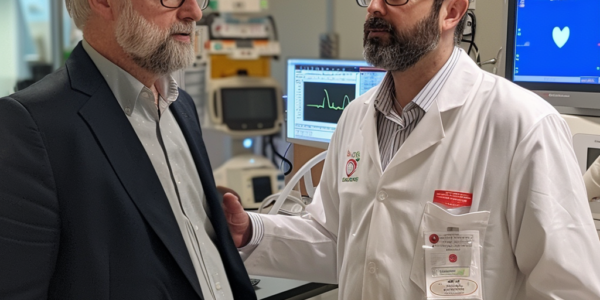Uptick in Ticks: Milder Weather Extends Tick Seasons
Learn about the uptick in tick activity due to milder weather, leading to longer tick seasons. With cases of Lyme disease and anaplasmosis already recorded, pet owners are advised to be vigilant and remove ticks from their animals to prevent the spread of diseases.
Study Finds Heart Attack Symptoms Can Occur Over a Month Before Attack
A recent study has found that individuals may experience symptoms such as chest pain, feeling heavy in the chest, heart palpitations, shortness of breath, and more, more than a month before suffering a heart attack. Recognizing and addressing these warning signs is crucial for preventing heart attacks.
Phenomix Sciences Launches MyPhenome Test to Identify Three Distinct Obesity Phenotypes
Phenomix Sciences has introduced a groundbreaking MyPhenomeTM test to identify and analyze three distinct obesity phenotypes in a single, convenient test. This innovative test offers individuals deeper insights into the underlying causes of their obesity, paving the way for tailored, effective interventions.
Understanding the Limitations of Heart Rate Zone Training
Learn about the limitations of heart rate zone training and the potential impact of external factors on heart rate readings during exercise. While heart rate can provide an objective measure of intensity, individual interpretations of exercise intensity may vary. Ultimately, maintaining a consistent exercise routine, regardless of the preferred intensity, is key to promoting cardiovascular health and overall fitness.
Gastroenterologist emphasizes importance of obtaining nutrients from food over supplements
Learn why Dr. Will Bulsiewicz, a gastroenterologist and US medical director of the nutrition company Zoe, emphasizes the importance of obtaining nutrients from food and using supplements to fill in the gaps. Discover the specific supplements he takes daily and how they complement his healthy diet.
Elon Musk Announces Robotaxi Unveiling and Exact Sciences Stock Surge
Elon Musk announces Robotaxi unveiling, while Exact Sciences stock surges following Freenome’s pivotal study results on blood-based colon cancer test. Despite Freenome’s promising results, Exact Sciences stock soars, reflecting market confidence and resilience. Analysts express optimism about Exact Sciences’ future performance, dispelling fears of cannibalization of stool-based tests. Exact Sciences’ next-generation Cologuard boasts competitive sensitivity and specificity figures, presenting a clear advantage over blood-based rivals. The company’s consistent innovation and market positioning have contributed to its resurgence and investor confidence.
Study Reveals Alarming Levels of Nanoplastics in Bottled Water
Groundbreaking study reveals alarming amount of nanoplastics in bottled water, posing potential health risks. Dr. Phoebe Stapleton co-authored the study, finding that each liter of water contains an average of 240,000 particles from seven different types of plastics, with nearly 90 percent being potentially dangerous nanoplastics. The study raises concerning questions about the impact of these particles on the human body, warranting further research and investigation into the safety of consuming water containing such high levels of plastic particles.
New AI Tool ‘Better Than the Naked Eye’ at Spotting Heart Attack Signs
A new AI tool is being used at a Wollongong heart clinic to predict which patients are at higher risk of a heart attack, revolutionizing heart disease detection. This groundbreaking technology is set to improve patient care and outcomes.
Cutting-edge technology used to fight tuberculosis in crowded Manila neighborhood
Cutting-edge medical technology is being used in Manila to combat tuberculosis, the planet’s top infectious killer. A portable X-ray machine and artificial intelligence program are used to quickly detect potential cases, followed by rapid testing to determine appropriate treatment.
New Study Reveals Limitations of Current Cystic Fibrosis Treatment
Researchers at the University of Geneva have discovered that a new treatment for cystic fibrosis, introduced in 2020, does not always prevent bacterial infections in the respiratory system. The treatment fails to prevent the development of ‘docking stations’ on the surface of the respiratory tract, to which bacteria attach themselves to infect the body. By studying 3D models of human lung cells, the scientists found that combining the current treatment with other molecules may restore cell balance and better prevent bacterial infections, shedding light on the limitations of the current treatment for cystic fibrosis and providing a potential pathway for improving patient care.










